The legislation was passed by 125 votes in favour and 61 against.
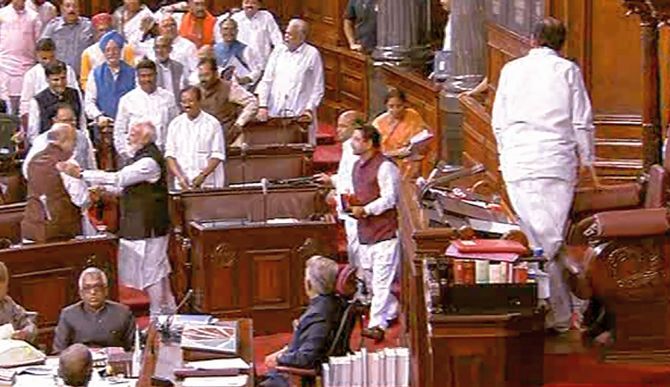
Rajya Sabha on Monday approved a resolution revoking the special constitutional status of Jammu and Kashmir and passed a bill to split the state into two Union Territories, as Home Minister Amit Shah promised to restore full statehood after normalcy is restored in the militancy-hit region.
The House passed by a voice vote the resolution to abrogate Article 370 and the accompanying Article 35A ending seven decades of autonomous state government.
The bill to split the state in two UTs -- Jammu-Kashmir and Ladakh -- was passed by 125 votes in favour and 61 against. One member abstained from voting while two Peoples Democratic Party members were debarred from the day's proceedings after they tore a copy of the Constitution of India in the House to protest against the move.
While the resolution was passed by voice vote, Aam Aadmi Party, Bahujan Samaj Party, YSR-Congress, Telugu Desam Party, Biju Janata Dal and All India Anna Dravida Munnetra Kazhagam supported the Jammu and Kashmir Reorganisation Bill.
Trinamool Congress, which earlier in the day vehemently opposed the abrogation of Article 370, staged a walkout before Shah began to reply to the debate.

Allaying opposition fears of all hell breaking loose after the move, Shah replied, "nothing will happen" and the region won't be allowed to turn into another battle-torn Kosovo.
"It was heaven on earth and will remain so," he said replying to the debate on the resolution and the bill which were taken up together.
He said full statehood will be restored to Jammu and Kashmir at an "appropriate time" and after "normalcy" returns.
Under Article 370 of the Constitution, Jammu and Kashmir enjoyed complete autonomy and the state legislature was free to draft its own laws except in the areas of communications, defence, finance, and foreign affairs.
Also, Indian citizens were prohibited from purchasing land in the state.

Replying to the debate on the issue in the House, Shah said there is no need for a Constitutional amendment and the President has already signed an executive order to abrogate Article 370.
"I want to assure the members that as soon as things become normal in the state... when the appropriate time comes, we will again restore its statehood. We don't have a problem with that," he said.
He repeatedly attacked the Congress for raising a bogey and said, "Give us five years, and we will make Jammu and Kashmir the country's most developed state."
"I want to tell the youth of Kashmir valley that have faith in Narendra Modi government. Nothing negative will happen. All these (opposition) people are telling you lies for their own politics. Don't listen to them.
"I want to tell through this House that things will turn for better in the next five years, then you will come to know that Article 370 was not right," he said.
Blaming Article 370 for the separatist movement in the state, he said terrorism cannot be eliminated in J-K until Article 370 and 35A are in existence.
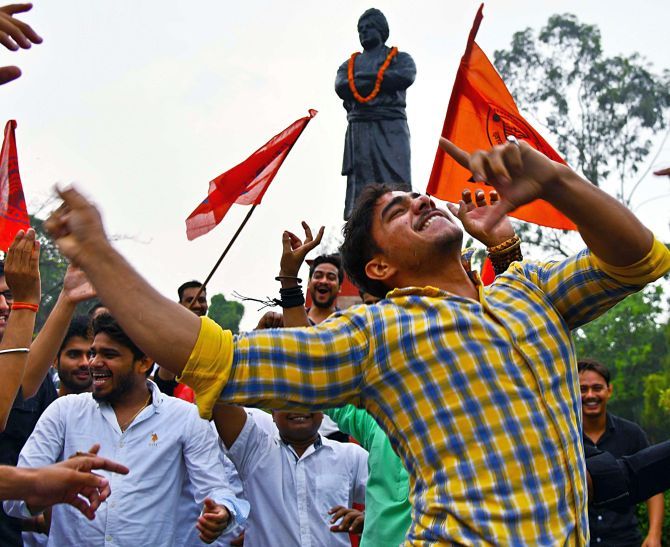
Because of the special constitutional status, the right to education could not be implemented in the state, he said.
Also, political reservation for Other Backward Classes and Dalits could not be implemented, healthcare is in a mess as no hospitals could be set up because of the rule prohibiting purchase of land by outsiders. The same was also the reason for no industry being set up, leading to unemployment, he said.
The two articles of the Constitution have hindered development and bred corruption, he said adding the rule of three families in the state in the last 70 years did not allow democracy to percolate.
Article 370 ruined Jammu and Kashmir and is responsible for poverty in the state, he said. This despite Rs 14,255 per capita being allocated to J&K as against Rs 3,681 per capita national average.
Tourism did not develop in the state because of restrictions on the purchase of land for outsiders, he said adding no industry can be set up in J&K because of Article 370.
Article 370 was a temporary provision, he asked and asked how long it can be allowed to continue.
Rajya Sabha approved the bill to extend 10 pc reservation to economically weaker sections in the state as well as the resolution on abrogating Article 370 by voice vote.
Home Minister Amit Shah accurately highlighted the "monumental injustices" of the past and presented the government's vision for the people of Jammu and Kashmir in Rajya Sabha, Prime Minister Narendra Modi said on Monday after the revoking of Article 370.
Sharing Shah's speech on his Twitter handle, Modi said the views put forth by the home minister were "extensive and insightful."
"It accurately highlighted the monumental injustices of the past and coherently presented our vision for the sisters and brothers of J-K. Do hear," the PM tweeted.
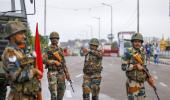

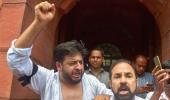





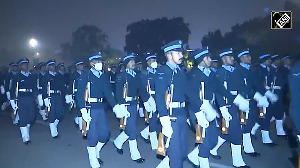
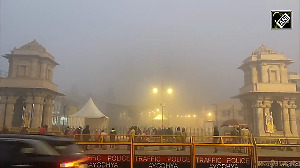
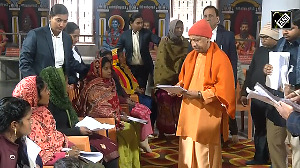
 © 2025 Rediff.com -
© 2025 Rediff.com -